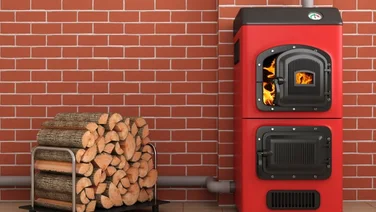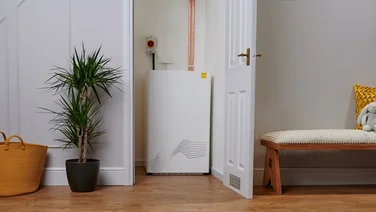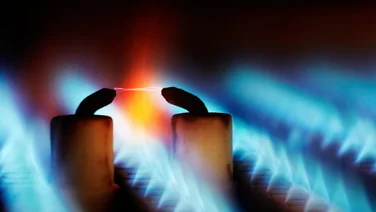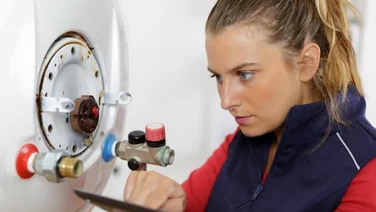We receive a small fee from trusted installers when you request a quote through our site. This helps us keep our content independent, well-researched and up to date – Learn more
- What's in this guide to combi boilers?
- What is a combi boiler?
- Combi boilers vs other types
- How do we assess the best combi boilers?
- Pros and cons of combi boilers
- Is a combi boiler right for you?
- How much does a new combi boiler cost?
- The best combi boilers in 2022
- Combi boiler grants
- Problems with combi boilers (FAQs)
- Finding a boiler installer
✔ A new boiler can save you up to £380 per year on energy bills
✔ Combi boilers are perfect for small households with 1-2 bathrooms
✔ Fill in the form above to receive boiler quotes from our trusted installers
The boiler is the beating heart of any home. It’s the fiery furnace that keeps your rooms toasty and your showers steamy, working tirelessly in the background.
Unfortunately, we only notice how much we love our boilers once they conk out on us and we’re left researching new boiler costs.
You could consider a combi boiler (‘combination boiler’) which is a nifty, compact alternative to a traditional boiler, perfect for households that are running low on space.
They were originally designed for one-bedroom or two-bedroom homes, but more recent models are capable of supplying much bigger properties.

On this page, we’ll tell you everything you need to know about combi boilers, including how they work, and how much they’ll cost you. We’ll also give a rundown of the best combi boilers of 2022.
To start collecting free quotes for a new boiler, simply fill in this form, and our professional installers will be in touch.
What’s in this guide to combi boilers?
Head straight to a specific section by clicking the links below
02 | Combi boilers vs other types
03 | How do we assess the best combi boilers?
04 | Pros and cons of combi boilers
05 | Is a combi boiler right for you?
06 | How much does a new combi boiler cost?
07 | The best combi boilers in 2022
08 | Combi boiler grants
09 | Problems with combi boilers (FAQs)
10 | Finding a boiler installer
What is a combi boiler?
A combi boiler combines two functions in one place: hot water and central heating. So, instead of requiring a hot water tank (like a system boiler), everything takes place within one compact, talented unit.
A combi boiler heats up water only when you need it, which is much better for the environment, and great for your energy bills.
Read our guide on what a new boiler might cost you if you’re thinking of getting one.
How does a combi boiler work?
A combi boiler never has a day off; it’s on constant standby. Even while you’re sleeping, the loyal combi boiler will be on high alert, able to deal with your watery requests at a moment’s notice.
Instead of storing loads of heated water in a big tank, a combi boiler does things a lot more last-minute. When you turn on the hot tap or start running a shower, cold water will be sourced from the mains, go through the combi, and get all fired up.
This magic happens because of the heat exchanger, which is powered by gas, oil, or electricity, among others (see more below). Hot water will come tumbling out of the tap or shower, and you simply won’t believe that it was cold just moments before.
You can find out how much a new boiler might cost here, including combi boilers.
What about central heating?
The central heating process is very similar. Cold water quickly turns into hot water, and is then sent on a journey through the radiators of your house.
Once the water has lost its warmth, it will go back to the boiler for reheating, and then get going again. It sounds exhausting.
However, although a combi boiler can do both, it can never do both at the same time. It can send hot water to your tap/shower or send hot water to your radiators, but won’t be able to handle both simultaneously.
This doesn’t mean that you won’t have hot radiators while your shower’s running – it just means you won’t be able to turn the heating up until you’re done showering.

As you can see in the diagram above, your household’s cold mains feed connects directly into the combi boiler.
This means that your combi boiler’s pressure will only ever be as high as the pressure of your cold mains feed – although, for most households, this is usually sufficient (around 2.5 bar).
One issue is that a combi boiler’s water pressure is affected by the number of outlets being used at any one time.
It can manage one hot shower, but have two running together, and you’ll see a decrease in pressure. Turn on a hot water tap, and there’ll be a further reduction.
This is why combi boilers are ideally suited to smaller homes, where it’s less likely that multiple outlets will be running simultaneously.
How is it installed?
The installation of a combi boiler is a fairly straightforward affair. You won’t need to have a cold water tank or a hot water tank fitted, and a combi comes with significantly less pipework than any other type of boiler.
However, unless you’re a qualified plumber, we certainly don’t recommend fitting a combi yourself – especially if it’s going to be powered by gas. Get yourself a Gas Safe registered engineer to do the job for you.
Not only is this a much more sensible, effective option, but you’ll also invalidate your boiler’s warranty if you perform the installation yourself.
What is a condensing combi boiler?
By law, every new boiler in the UK has to be condensing, so it might help to know what that means.
All boilers have a flue, which is basically a little pipe on an external wall that all waste gases (e.g. nitrogen dioxide) go through before floating off into the world.
The sad thing is that these gases still have heat that can be used.
A condensing boiler has a ‘flue gas heat recovery system’ for this very reason. The gases are snatched up before they have a chance to leave the flue and are used again, heating more water.
This is doing the environment a solid favour, and reducing your energy bill, too.
Condensing combi boilers are generally around 95% efficient, which is a huge improvement on past models. Many older boilers struggle along at just 55% efficiency, which is a bit embarrassing.
This is why making the switch from an old boiler to a high-efficiency combi boiler can make such a difference to your energy bills.
Take a look at: How Long Does A Boiler Last?
Combi boilers vs other types
We put the combi boiler head-to-head against the two other popular types of boiler, assessing them based on features such as eco-friendliness, noise, and price.
For clarification: the better the star rating, the less noisy the boiler is.
Please note that all the below values are averages only.
|
Type of boiler |
Energy efficiency |
ErP rating |
Price |
Installation cost |
Noise |
Eco-friendliness |
|---|---|---|---|---|---|---|
| Combi | 95% | AA | £700 | £1,850 | ★★★★ | ★★★★★ |
| System | 94% | A | £900 | £2,000 | ★★★ | ★★★★ |
| Conventional | 93% | A | £900 | £2,250 | ★★ | ★★★★ |
We’ve also ranked the four most popular ways of powering a boiler, again based on the same factors. You’ll see that gas and electric come up tops.
|
Type of boiler |
Energy efficiency |
ErP rating |
Price |
Installation cost |
Noise |
Eco-friendliness |
|---|---|---|---|---|---|---|
| Electric | 99% | D | £800 | £2,750 | ★★★★★ | ★★★½ |
| Gas | 94.5% | AA | £830 | £2,000 | ★★★ | ★★ |
| Oil | 91.6% | A | £1,800 | £2,800 | ★★ | ★ |
| Biomass | 93.5% | A+ | £10,000 | £2,250 | ★ | ★★ |
As you can see, the world of combi boilers can be a little overwhelming. If you need a little more guidance before taking the leap and forking out all that money, get in contact with our local professionals to receive quotes.
How do we assess the best combi boilers?
Here’s a breakdown of all the key features we’ve used to assess combi boilers. You’ll notice that some of these aren’t included in the tables above, but you’ll certainly find them in our more technical tables below (where we discuss specific models of combi boiler).
Price
This is easily one of the most important factors to consider when you’re making a significant investment.
Even if a certain type of boiler is perfect for your home, you’ll always be restricted by your budget.
Energy efficiency
A boiler’s ‘energy efficiency’ refers to the percentage of energy created that is used by your house vs the energy that goes to waste.
Naturally, the more inefficient the boiler, the more money you’ll be spending to heat your home. Therefore, it’s really important that you get a high-efficiency boiler.
You’ll see energy efficiency measured in two ways:
1) Firstly, the ErP rating (previously known as SEDBUK) assesses the boiler’s efficiency in two categories: hot water and central heating.
This is given as two separate grades (from A-G), and most boilers on the market today achieve an AA rating.
2) Secondly, there’s a percentage figure, which refers to the proportion of fuel that is converted into usable energy for your home.
For example, if you had a boiler with 95% efficiency, that would mean for every £1 you spend on gas/electricity, you’d only lose 5p on wasted energy.
In the UK, all boilers must now legally have at least 92% efficiency.
Noise
Every boiler makes a noise, ranging from a whispery whir to a loud hum. The quieter the better, obviously. A boiler’s noise is measured in decibels (dB), but this might not mean anything to you.
To use an everyday example, a human conversation typically ranges between 40-60dB, so ideally you should be looking for a boiler that’s 50dB or below.
Output
Normally measured in kilowatts (kW), a boiler’s ‘output’ refers to how much hot water it can generate at any given time.
If you live in a one-bedroom or two-bedroom house, a 24-27kW combi boiler will probably be sufficient, capable of running about 10 radiators and one bathroom.
Meanwhile, in a larger house (i.e. three or four bathrooms), a 28-35kW boiler would be more suitable.
Eco-friendliness
The key culprits in any boiler’s ‘waste gases’ are nitric oxide and nitrogen dioxide (collectively known as NOx), which aren’t great for the environment.
NOx goes around causing reactions that create ozone and acid rain, which in turn damage forests and lakes. A boiler’s NOx output is measured in mg/kW, and is typically around the 20-40 mark.
Replacing your machine with a newer combi boiler could help you to save up to £300 a year on your heating bills.By using less energy, you can cut your carbon footprint down a substantial amount.
Size
You always have to consider how much space your new boiler is going to take up.
Fortunately, the key advantage of combi boilers is that they’re all fairly small, and some of them are even the size of a kitchen cupboard.
Flow rate
Specific to combi boilers, ‘flow rate’ refers to the quantity of hot water that can pass through a tap in one minute (measured in litres per minute, or l/m).
Although each combi boiler comes with its own ‘flow rate’, your hot water pressure will ultimately be determined by the pressure of your cold water mains feed.
Pros and cons of combi boilers
If you’re still not sure if a combi boiler is what you need, allow us to help you weigh up the good and the bad.
Advantages of a combi boiler
✔ You’ve got the power. The lack of storage tank means that the water is drawn directly at mains pressure, so you can enjoy a proper power shower without needing to buy an extra pump. You’ll have a blast!
✔ Extra wriggle room. What’s more, the compactness of the combi boiler means there’s space in your house for something more enjoyable.
With hot water cylinders and cold water tanks out of the way, think of the exciting objects that could take their place. Your loft will be a lot roomier, and your airing cupboard could just become a nice place to stand in.
✔ Speedy installation. When you buy a new boiler, the initial cost of installing it can be pretty hefty, but a combi boiler barely takes any time to install.
It has way fewer parts and significantly less pipework than other types of boiler. It’s simple: a shorter installation time means a smaller fee.
✔ No heat loss. With other types of boiler, energy is wasted on keeping the tank of water permanently hot. Heat escapes (it always does), and the boiler has to use more energy to replace it.
Not with a combi. By heating water only when it is required, barely any energy is wasted, and you save money on your bills.
✔ Your pipes are less likely to freeze. Why? Because a combi boiler has very few pipes. You can’t have frozen pipes if you don’t have pipes to freeze.
Disadvantages of a combi boiler
✘ It can’t deal with more than a few people. As a combi boiler draws water directly from the mains, it can’t support multiple outlets at the same time.
If you have two hot showers running, there’ll be a pressure drop. Add a third shower and the pressure will drop some more.
Chuck a few hot taps into the mix and you’ll start to feel sorry for it. A house with lots of people and numerous showers is not a place for a combi.
But wait! There are solutions. You can install an accumulator tank (costing between £500-£1000), which will store some extra high-pressure water and give your combi a hand on busy shower days.
Another option is a mains booster (costing around £300-£500), built to receive incoming mains water and give it some added oomph.
✘ There’s a ‘combination’ trade-off. The combi boiler combines central heating with hot water in one magical mixture, but they don’t get along 100% of the time.
Whenever you turn on a shower or a hot tap, the central heating will pause and all priority will be given to your hot water needs. Once the hot water stops running, the central heating will kick in again.
This doesn’t sound ideal, but the central heating pause will rarely last long enough to cause a problem – unless you take unreasonably long showers (stop doing that).
✘ No emergency backup. If a traditional boiler gives up, you can normally use an immersion heater to provide some short-term relief.
With a combi boiler, that isn’t an option, so you’re stuck using the kettle. The silver lining is that immersion heaters are expensive to use, so at least you don’t even have the option to spend bucket loads of money on hot water.
✘ It doesn’t like solar panels. There isn’t really much compatibility between combi boilers and solar thermal technology. Solar panels usually need a hot water tank, and combis are tank-less.
Is a combi boiler right for you?
It’s in flats and small houses that combi boilers come into their element. You really see them take on a whole new level of confidence.
Nobody wants the boiler to be the centrepiece of their home, and the compactness of a combi boiler is perfectly suited to small properties.
In fact, many combi boilers are so dainty that they can fit inside a kitchen cupboard, hidden from view and allowing you to make the most of your precious space.
If you live in a small property with only one bathroom, a small entry-level combi boiler should provide you with all the heating and hot water you need. For example, a 24-27kW combi boiler can heat up to 10 radiators and provide hot water for one bathroom.
However, combi boilers are not limited to small properties. Certain models can reach up to 50kW of power, and are capable of serving multiple bathrooms.

Should I get an oil, electric, or gas combi boiler?
Combi boilers can’t power themselves; you need to use oil, electricity, or gas. So what do you go for?
Gas combi boilers
Mains gas is the cheapest option.
A gas-powered combi boiler needs to be serviced every year by a qualified, registered gas engineer who is on the Gas Safe Register (formerly CORGI registered).
A malfunctioning gas boiler is serious business, as it can release carbon monoxide and poison the air in your home – so a carbon monoxide detector is highly advisable.
To have a gas-powered boiler, your home needs to be connected to the gas grid. The majority of UK households are on the gas grid, although about four million of them (or around 15% of the country’s population) are not – and that’s when you need an alternative.
Oil combi boilers
This is your next cheapest option if you’re not on the gas grid, generally costing around 75% less than electric.
Unfortunately, it does demand a bit of physical space, as you need an actual tank of oil sat outside your home. Also, since you won’t have an unlimited supply of oil, you’ll need to make sure you don’t run out.
Electric combi boilers
If your house is off the gas grid and there isn’t any space for a tank of oil outside, electricity is a pretty handy choice.
It’s the most expensive of the three options, but the installation is very straightforward – and what’s more, electric combi boilers can be up to 99% efficient.
Another benefit of electric combis is that they don’t have a flue (because there are no waste gases), which means the boiler doesn’t have to be on an outside wall. You’ll also dodge the carbon monoxide risk that comes with gas-powered boilers.
On the negative side, the manufacturing of electricity can often have a huge carbon footprint. Your energy bills will be pretty big, and electricity prices are always on the up. Plus, a power cut will leave you in a world of coldness.
How much does a new combi boiler cost?
A new combi boiler typically costs around £700, although the cost of installation will push the total up to around £2,500. Check out the table below for a general idea of combi boiler costs.
|
Boiler |
Buy |
Install |
Run (annual) |
Total |
Buy + install |
|---|---|---|---|---|---|
| Combi (gas) | £700 | £1,850 | £551 | £3,101 | £2,550 |
For more information, take a look at our detailed guide to boiler costs in 2022. On this page, we also cover system boilers, conventional boilers, and biomass alternatives.
Cheap combi boilers
If you’re looking for a combi boiler that’s reliable and affordable, consider the Baxi 200 Combi.
Endorsed by the Energy Saving Trust, Baxi’s 200 Combi is efficient, easy to install, and can be operated using a smartphone or tablet. It ticks all the boxes without costing too much.
The data below is for the 24kW model.
|
Feature |
Baxi 200 Combi 24kW |
|---|---|
| ErP rating | AA |
| Fuel | Gas condensing |
| Noise (decibels) | 48 |
| Efficiency | 93% |
| Power output (kW) | 24 |
| Nitrogen oxides (mg/kWh) | 38 |
| Size (mm) | 700 x 395 x 279 |
| Weight (kg) | 26 |
| Typical price | £613.63* |
| Warranty | 2 years standard** |
| Combi flow rate at the hot water tap (@ 35°C temp rise) | 9.8l/m |
*Price information sourced from www.plumbnation.co.uk. Excluding the cost of installation.
**Available when registered within 30 days of installation and serviced annually.
The best combi boilers in 2022
We’ve scoured the market and handpicked the seven best combi boilers of 2022, based on key features such as efficiency, power output, warranty, and price.
All information has been sourced from the boiler models’ official datasheets, apart from the prices, which are from PlumbNation.
We’ve ranked the boilers in terms of their efficiency, but other features might be more important to you.
This is by no means an exhaustive list. You can learn more in our complete guide to the best boilers, which includes system and conventional boilers, too.
|
Manufacturer |
Model |
Power output |
Efficiency |
Standard warranty* |
Best for |
|---|---|---|---|---|---|
| Worcester Bosch | Greenstar 8000 Style | 30-50kW | 94% | 5 years | Power output |
| Vaillant | ecoTEC pro | 24-30kW | 94% | 2 years | A bit of everything |
| Vaillant | ecoTEC Plus Combi Store 938 | 38kW | 94% | 5 years | Quietness |
| Ideal | Logic+ Combi | 24-35kW | 94% | 7 years | Standard warranty |
| Viessmann | Vitodens 200-W | 26-35kW | 98% | 3 years | Energy efficiency |
| Baxi | Duo-tec | 24-40kW | 92% | 7 years | Eco-friendliness |
| Potterton | Assure | 25-36kW | 93% | 2 years | Small size |
*All models listed here (except the Potterton Assure) have 10-year warranties available, dependent on particular T&Cs.
That’s a swift breakdown of the top seven, but here’s a little bit more detail about each of the boilers, including the best options for smaller and larger homes.
Worcester Bosch Greenstar 8000 Style
The best combi boiler for power output
The Greenstar 8000 Style is one of the most powerful combi boilers on the market, with output capability ranging from 30kW to a mighty 50kW.
This means it can power up to three bathrooms, with an impressive flow rate of 17.9l/m for the 50kW model.
This boiler also comes with an Intelligent Filling System, meaning it’s wired to correct any pressure drops automatically, saving you the faff.
What’s more, it has a colourful LCD display, and wireless connectivity to a smart thermostat (called Bosch EasyControl).
You can get the Greenstar 8000 Style in five different outputs: 30kW, 35kW, 40kW, 45kW, or 50kW. The data below is for the 50kW model.
|
Feature |
Greenstar 8000 Style 50kW |
|---|---|
| ErP rating | AA |
| Fuel | Gas condensing |
| Noise (decibels) | 53 |
| Efficiency | 94% |
| Power output (kW) | 50 |
| Nitrogen oxides (mg/kWh) | 24 |
| Size (mm) | 780 x 440 x 365 |
| Weight (kg) | 56 |
| Typical price | £2,180.98 |
| Warranty | 5 years standard, with up to 10 years available (T&Cs apply) |
| Combi flow rate at the hot water tap (@ 40°C temp rise) | 17.9 l/min |
Vaillant ecoTEC pro
The best combi boiler for a bit of everything
Hand-built in Vaillant’s award-winning factory in Derbyshire, the ecoTEC pro is a solid performer in all categories.
Its easy-to-use setup is a big plus point for users, and the boiler offers an impressive 94% efficiency. There’s also an LPG alternative available for off-grid households where gas isn’t an option.
The ecoTEC pro comes in three different outputs: 24kW, 28kW, or 30kW. The data below is for the 24kW model.
|
Feature |
Vaillant ecoTEC pro 24 |
|---|---|
| ErP rating | AA |
| Fuel | Gas condensing |
| Noise (decibels) | 49 |
| Efficiency | 94% |
| Power output (kW) | 24 |
| Nitrogen oxides (mg/kWh) | 27 |
| Size (mm) | 720 x 440 x 338 |
| Weight (kg) | 38 |
| Typical price | £964.28 |
| Warranty | 2 years standard, with 7-10 years available when you book a Vaillant Advance installer |
| Combi flow rate at the hot water tap (@ 35°C temp rise) | 9.6 l/m |
Vaillant ecoTEC Plus Combi Store 938
The best combi boiler for quietness
With just 43 decibels of noise, the Vaillant ecoTEC Plus Combi Store 938 is one of the most peaceful combi boilers on the market, as proven by its Quiet Mark accreditation.
This is an award given to ultra quiet, reduced-noise designs by the Noise Abatement Society. The folks there just hate noise.
This boiler is only available in one capacity – 38kW – which means it’s highly suited to larger households (i.e. two or three bathrooms). Check out the key data below.
|
Feature |
Vaillant ecoTEC Plus Combi Store 938 |
|---|---|
| ErP rating | AA |
| Fuel | Gas condensing |
| Noise (decibels) | 43 |
| Efficiency | 94% |
| Power output (kW) | 38 |
| Nitrogen oxides (mg/kWh) | 35 |
| Size (mm) | 720 x 440 x 600 |
| Weight (kg) | 60 |
| Typical price | £1,573.99 |
| Warranty | 5 years standard, up to 10 years available when fitted by a Vaillant Advance installer |
| Combi flow rate at the hot water tap (@ 35°C temp rise) | 15.9l/m |
Ideal Logic+ Combi
The best combi boiler for warranty
Most combi boilers come with 2-5 years standard warranty, but the Ideal Logic+ Combi offers an impressive 7 years.
There’s also a 10-year warranty available, although this is subject to specific terms and conditions (such as annual servicing from an Ideal engineer).
This boiler is endorsed by the Energy Saving Trust, and it’s compact enough to fit inside a cupboard. Plus, its transparent condensate siphon means that you can easily spot any debris, and deal with it before it causes problems.
The Logic+ is available in three different capacities: 24kW, 30kW, or 35kW. The two larger sizes have LPG alternatives, but the 24kW model is gas-only.
The data below is for the 24kW model.
|
Feature |
Ideal Logic+ Combi 24kW |
|---|---|
| ErP rating | AA |
| Fuel | Gas condensing |
| Noise (decibels) | 48 |
| Efficiency | 94% |
| Power output (kW) | 24 |
| Nitrogen oxides (mg/kWh) | 28 |
| Size (mm) | 700 x 395 x 278 |
| Weight (kg) | 29.2 |
| Typical price | £791.98 |
| Warranty | 7 years standard, up to 10 years available subject to T&Cs |
| Combi flow rate at the hot water tap (@ 35°C temp rise) | 9.9l/m |
Viessmann Vitodens 200-W
The best combi boiler for energy efficiency
Looking to get the most out of your energy bill spend? The Viessmann Vitodens 200-W has 98% efficiency, meaning only 2p of each £1 you spend on heating your home goes to waste.
Unsurprisingly, this boiler was endorsed by Which? as a Best Buy in 2018.
With fancy components like a MatriX cylinder burner and an Inox-Radial heat exchanger, the Vitodens 200-W is a high-functioning genius.
It’s not really suited to small, one-bedroom properties, as it’s only available in three fairly hefty capacities: 26kW, 30kW, or 35kW. The data below is for the 35kW model.
|
Feature |
Viessmann Vitodens 200-W 35kW |
|---|---|
| ErP rating | AA |
| Fuel | Gas condensing |
| Noise (decibels) | 51 |
| Efficiency | 98% |
| Power output (kW) | 35 |
| Nitrogen oxides (mg/kWh) | 39 |
| Size (mm) | 850 x 450 x 375 |
| Weight (kg) | 40 |
| Typical price | £1,605.23 |
| Warranty | 7 years standard, up to 10 years available subject to T&Cs |
| Combi flow rate at the hot water tap (@ 35°C temp rise) | 9.9l/m |
Baxi Duo-tec Combi
The best combi boiler for eco-friendliness
If you hate nitric oxide and nitrogen dioxide as much as Mother Nature does, the Baxi Duo-tec Combi will align perfectly with your feelings.
This boiler produces just 20mg of NOx per kWh, which is impressively low. Whenever there’s acid rain or a local polluted lake disaster, you’ll know you had practically nothing to do with it.
On top of its mere trickle of NOx, this boiler also comes with a 7-year standard warranty, matching Ideal’s Logic+. However, there’s a tradeoff: the Duo-tec is slightly too big to fit inside a kitchen cupboard.
You can get the Duo-tec in four different capacities: 24kW, 28kW, 33kW, or 40kW. If you want an LPG alternative, we’re afraid that only applies to the 28kW model.
The data below is for the 24kW model.
|
Feature |
Baxi Duo-tec Combi 24kW |
|---|---|
| ErP rating | AA |
| Fuel | Gas condensing |
| Noise (decibels) | 50 |
| Efficiency | 92% |
| Power output (kW) | 24 |
| Nitrogen oxides (mg/kWh) | 20 |
| Size (mm) | 780 x 450 x 345 |
| Weight (kg) | 40.2 |
| Typical price | £722.98 |
| Warranty | 7 years standard, up to 10 years available subject to T&Cs |
| Combi flow rate at the hot water tap (@ 35°C temp rise) | 9.8l/m |
Potterton Assure Combi
The best combi boiler for small size
You’ll barely notice the Potterton Assure Combi. Measuring just 700m in height, 390mm in width, and 285mm in depth, this adorable combi boiler will easily tuck inside one of your kitchen cupboards.
It also weighs less than 30kg, which is at least 10kg less than the average combi boiler.
Naturally, a boiler this small is quick and easy to install, meaning you won’t have an engineer round for too long. The Assure Combi is available in outputs of 25kW, 30kW, or 36kW, with LPG alternatives for the 25kW and 30kW models.
The data below is for the 25kW model.
|
Feature |
Potterton Assure Combi 25kW |
|---|---|
| ErP rating | AA |
| Fuel | Gas condensing |
| Noise (decibels) | 48 |
| Efficiency | 93% |
| Power output (kW) | 25 |
| Nitrogen oxides (mg/kWh) | 31 |
| Size (mm) | 700 x 390 x 285 |
| Weight (kg) | 29.2 |
| Typical price | £796.06 |
| Warranty | 2 years standard, subject to registration and annual service |
| Combi flow rate at the hot water tap (@ 35°C temp rise) | 10.2 l/m |
Combi boiler grants
Not sure you can cobble together the funds for a new boiler? The UK Government’s Energy Company Obligation (ECO) might be able to help you.
If you meet certain requirements, you could be eligible to have your old boiler replaced for free (or at least subsidised).
So what are the requirements? Firstly, you need to be living in social housing, and own a non-condensing boiler that’s a minimum of five years old.
Take a look at the official government page to find out how to apply, though the scheme now only applies to gas boilers.
Problems with combi boilers (FAQs)
Here we delve into some problems that combi boiler owners sometimes have to deal with.
However, we strongly advise that you don’t attempt to fix boiler issues on your own – especially if you have a gas boiler.
A helpful Gas Safe registered engineer is usually just a phone call away.
Why does my combi boiler have low pressure?
There are several reasons why your combi boiler might have low pressure, such as a water leak in the system, a broken pressure valve, or if you’ve recently bled one of your radiators.
It’s possible to repressurise your boiler by turning the small tap on your boiler’s filling loop (and increasing the pressure back to 1.5 bar), but this isn’t recommended as a solo enterprise, particularly if you have a gas boiler. Phone an engineer.
Why is my combi boiler not heating my radiators?
Hot water running, but no central heating? You might have pockets of air trapped in your radiators, which can lead to unequal heat distribution (and cold patches).
You can bleed your radiator to release the air, but bear in mind this could also lead to an overall drop in your system’s pressure.
This sounds like a catch-22, but it’s easy to fix low system pressure (see above).
Why is my combi boiler not turning on in winter?
If your combi boiler isn’t playing ball on an ice-cold day, this is probably because its condensate pipe is frozen. For a handy explanation of what to do, check out Viessmann’s guide to thawing a frozen condensate pipe.
Why is my combi boiler switching itself off?
A combi boiler that keeps switching itself off might simply be begging you for a service.
Something could be wrong with the flue pipe, and this can affect the entire system. It’s simple: arrange a boiler service, have the flue pipe checked for any blockages/corrosion, and make sure the burners and jets get cleaned.
Your boiler might just need repressurising, but that’s for an engineer to decide.
Finding a boiler installer
If a combi boiler sounds like the right thing for your home, your next step is to find the most suitable model and a reliable installer – all for a competitive price.
That’s where we come in. Simply fill in this short form, and some of our local, professional installers will be in touch with free boiler quotes.








